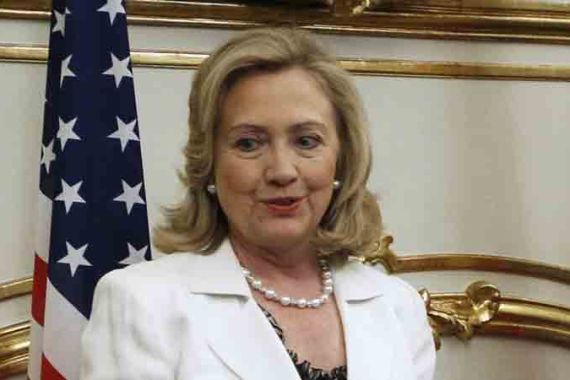Clinton calls on Gaddafi to step down
Libyan leader should stop issuing threats against Europe and should quit instead, US secretary of state says.

Hillary Clinton, the US secretary of state has said Muammar Gaddaf should resign instead of issuing threats after the Libyan leader threatened on to attack European “homes, offices and families” unless Nato stopped bombing his country.
“Gaddafi should put the well-being and the interests of his own people first and he should step down from power,” Clinton said in Madrid on Saturday.
“The NATO-led mission is on track. The pressure on Gaddafi is mounting and the rebels have been gaining strength and momentum. We need to see this through and we are in complete agreement that we will.”
NATO said on Saturday that it was increasing the number of air strikes on western Libya, an area largely under Gaddafi’s control.
‘Catastrophe’
In a telephone address through loudspeakers to thousands of supporters gathered in Tripoli’s Green Square, on Friday, Gaddafi warned the NATO-led alliance to stop its war support or face “catastrophe”.
In the speech, 100 days after NATO first entered the country, Gaddafi gave multiple warnings to foreign forces that have been militarily supporting anti-regime rebels for months.
“We advise you to retreat before you face a catastrophe… If we decide to, we are able to move to Europe like locusts, like bees,” Gaddafi said as a crowd of supporters waved green flags and posters of the leader.
Addressing the West, Gaddafi warned that Libyans could take revenge on Europe for its support of rebel forces.
“We can decide to treat you [Europe] in a similar way,” adding, “if we decide, we can also move it [the war] to Europe, to target your homes, offices, families, which would become legitimate military targets, like you have targeted our homes.”
“I advise you to ground your planes… and to hold discussions with the Libyan people,” Gaddafi said, denouncing an arrest warrant against him issued on Monday by the International Criminal Court (ICC).
French weapons
In his speech, the embattled Libyan leader addressed the thronging crowd of supporters, giving them specific direction surrounding a French weapon drop earlier in the week.
“March on the jebel [Nafusa] and seize the weapons that the French have supplied [to rebel forces]. If later you want to pardon them [the rebels], that’s up to you.”
Alain Juppe, the French foreign minister, said in Vienna on Friday that this week’s arms drop was meant only to defend peaceful civilians from Gaddafi’s forces and thus fell in line with existing UN resolutions on the conflict.
“Civilians had been attacked by Gaddafi’s forces and were in an extremely vulnerable situation and that is why medicine, food and also weapons of self-defence were parachuted,” Juppe said, speaking on France Inter radio.
Friday’s was one of the largest pro-government rallies in recent weeks, coming just days after the International Criminal Court issued arrest warrants for Gaddafi and two others.
Rebel retreat
On Friday, anti-government forces who had advanced to within 80km of Gaddafi’s stronghold in the capital were forced to retreat after coming under a barrage of rocket fire from government forces.
A rebel advance five days before to the outskirts of the small town of Bir al-Ghanam had raised the possibility of a breakthrough in the four-month old conflict that has become the bloodiest of the “Arab Spring” uprisings.
Rebel fighters who had been on the outskirts of the small town of Bir al-Ghanam and preparing for an attack were forced to pull back under fire from Russian-made Grad rockets, said a Reuters photographer in Bir-Ayyad, 30km to the south.
He said the rocket barrage was now reaching as far back as Bir-Ayyad, a road junction in the foothills of the Western Mountain range southwest of Tripoli from where the rebels had launched their advance last week.
The reversal underlines the resilience of Gaddafi’s forces, who have withstood 15 weeks of bombardment by NATO missiles and warplanes, and attempts by rebels on three fronts to break through their lines.
The Libyan conflict has sent ripples far beyond the North African country of six million people.
The fighting has halted Libyan oil exports, helping push up world crude prices to about $111 a barrel.
AU rejection
On Friday the rebels faced another setback – this time on the diplomatic front – when African leaders refused to execute an ICC arrest warrant issued for Gaddafi.
Leaders meeting at the African Union (AU) summit in Equatorial Guinea said “member states shall not co-operate in the execution of the arrest warrant” as it “seriously complicates” efforts to find a peaceful solution to the Libyan conflict.
The warrant hinders “finding a negotiated political settlement to the crisis in Libya, which will also address, in a mutually reinforcing way, issues related to impunity and reconciliation”, a text of the decisions released at a summit assembly said.
Yvonne Ndege, Al Jazeera’s correspondent in Malabo, said the AU’s decision “hardly comes as a surprise”.
“This clearly sets African nations on a further collision course with the ICC,” she reported.
Moussa Ibrahim, spokesman of the Libyan government, praised the AU’s decision, saying “we salute their courage”.
“It’s not the first time the African leaders stand with dignity and honour against the imperialist institutions of the West,” Ibrahim said on Saturday.
“The African leaders are wise enough and courageous enough to understand that the ICC is a European Guantanamo Bay.”